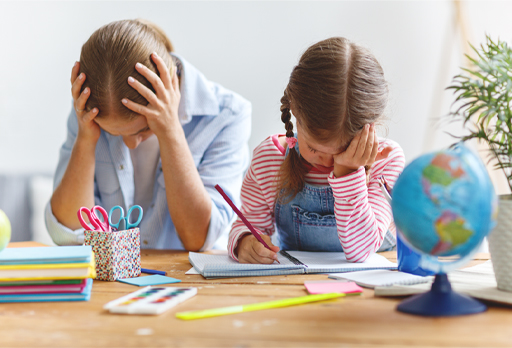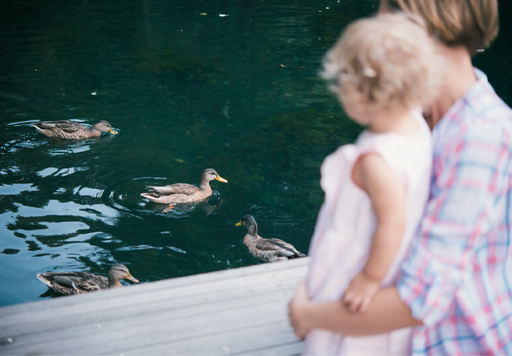4 Working with voluntary organisations
Voluntary organisations can play a significant role in supporting children’s mental health by working with families. In a similar way to children, parents can struggle with events in their lives that can make it difficult for them to cope with parenting their children.
Events such as the death of a family member or friend and the associated grief linked to the bereavement can understandably have a negative impact on parents (and children) and their mental health. There are several voluntary organisations that offer advice and support for families in times of difficulty, including after a bereavement; for example, CRUSE supports bereaved families. Home-Start UK offers more general support to children and families who are experiencing difficulties for a range of reasons.
Some of Home-Start’s work is focused on supporting mothers who are experiencing post-natal depression. Mothers with post-natal depression are more likely to have difficulty forming an early attachment with their baby, and this in turn can impact on their children’s mental health.
Activity 4 Family support through Home-Start
Read the following case study by a colleague at The Open University who is also a volunteer for Home-Start. The case study is about Kasia and Janek and their children. Then consider your responses to the questions that follow.
Case study: Kasia and Janek
Kasia and her husband Janek live in a flat in a rural village in the south of England, where they have been for almost a year with their children, Lena, aged two-and-a-half years, and a baby boy, Leon, aged three months.
The couple have a car and Janek drives to work each day, but Kasia does not drive. They did not have any friends or family locally, having moved from London. Kasia had become isolated and was feeling anxious and depressed, finding it difficult to leave the first floor flat with two young children. She often felt tearful. Consequently, the children spent very little time outside the flat or in the company of different people.
Kasia’s health visitor referred the family to Home-Start as she was concerned about Kasia’s wellbeing and that of the two children. Lena was beginning to speak in Polish but had only a few words. Some of her physical skills appeared slow to develop. She didn’t run or jump or attempt to kick a ball. Indeed, it was difficult to allow or encourage such activities without disturbing the people in the flat below, who worked nights. Kasia told her Home-Start volunteer that she would like help in getting out and about and making new friends.
Over a nine-month visiting period, the Home-Start volunteer and the family started by walking to the local shop and duck pond together, encouraging Lena to help look for items on the shelves, chat to the shop assistant and hand over money to pay. Lena fed the ducks and chatted about them, Leon watching eagerly with waving hands.
They progressed to finding out about a parent and toddler group in the local church, which they attended together weekly. The Home-Start volunteer helped broker communication between Kasia and other local mothers while helping the children to take part in the play activities, including a toddler slide and climbing frame. Every session ended with nursery rhymes and singing, which Kasia and the Home-Start volunteer repeated with the children once they had arrived back at the flat.
By the end of the nine months, Kasia had made two new friends with children locally. They helped her to use the local bus service for outings with the children and to visit a preschool, where Lena started when she was three.
Questions for reflection:
- In what ways did the Home-Start volunteer help to support Kasia’s health and wellbeing?
- In what ways did the Home-Start volunteer’s help contribute to the children’s health and wellbeing?
- What skills did the Home-Start volunteer use to help the family?
- What local resources helped the family’s health and wellbeing?
Discussion
You may have thought that the Home-Start volunteer helped Kasia to develop confidence simply by helping her to leave the flat. Clearly, Kasia was worried about disturbing the neighbours below, who may have become annoyed with the family. This may have led to her limiting the children’s movement in the flat, which meant that they were not given the opportunity to develop their physical skills. Getting out of the flat helped Kasia to meet new people and to interact within her local community.
The Home-Start volunteer showed that she had patience and she didn’t rush Kasia. She had carefully worked out a step-by-step approach to supporting Kasia, starting with walks to the shop and the duck pond and ending by making new friends. During the nine months, she supported Kasia to make friends by initiating conversations with other mothers and then drawing Kasia in to the chats. As Kasia’s first language isn’t English, she may have helped Kasia’s confidence by interpreting some words or explaining parts of the conversation.
The local resources helped the whole family. The health visitor is an employee of the National Health Service, but part of their role is to offer support to young children from birth to five years of age. By recognising that the family could benefit from support and being aware that Home-Start was available in the local area, she was able to make a referral. The neighbourhood had the duck pond, which was a draw for the children and a gentle introduction to the area for Kasia. The local shop also gave Kasia the opportunity to socialise and learn more about living in England.
Fortunately, the family were comfortable going to a group based in a local church (some families would not be willing to attend sessions conducted in a place of worship) as the church offered a parent and toddler group, giving parents the opportunity to come together and socialise. And very importantly, the parent and toddler group was well-resourced with suitable play equipment and toys, which gave the children the opportunity to develop their physical skills: an opportunity that was not available at home.
The songs and rhymes that Kasia and the children learned gave them an opportunity to do an enjoyable activity together, thus helping them to bond. The rhymes also helped the family to develop their English and for the children to develop their communication and language skills.
As well as illustrating the work of a voluntary service, the case study highlights how, because the health visitor was aware of the benefits of a voluntary agency, she was able to draw on the services of the Home-Start volunteer to support the whole family to improve their wellbeing.


